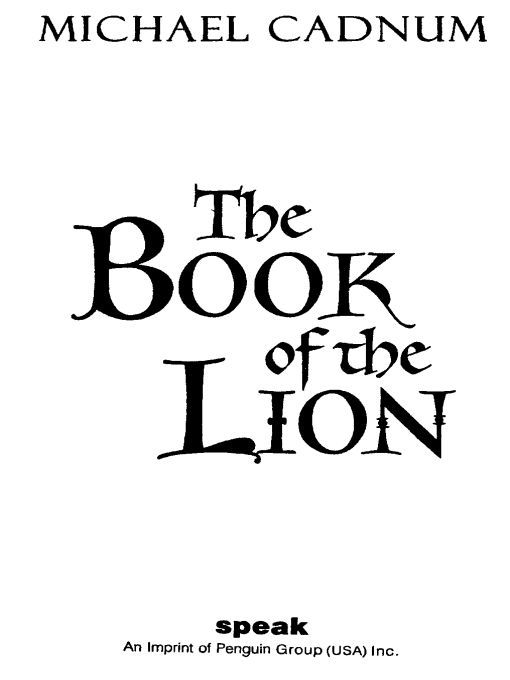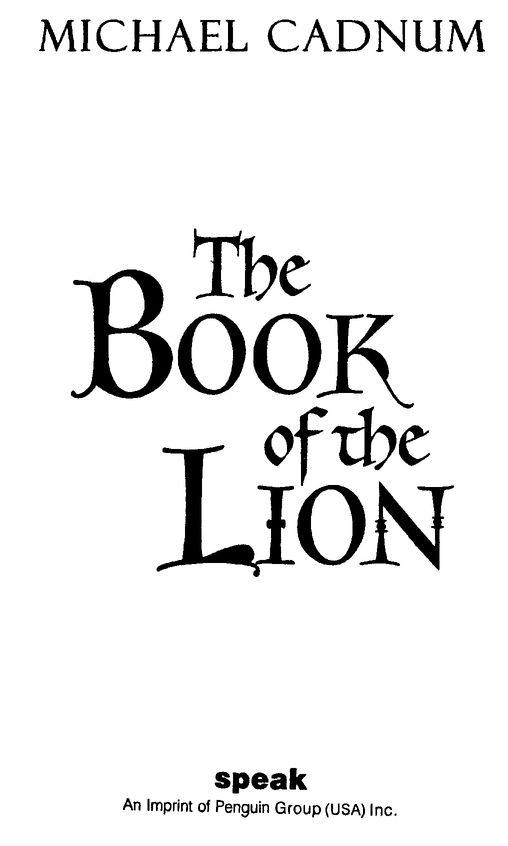The Book of the Lion
Read The Book of the Lion Online
Authors: Michael Cadnum


Table of Contents
Â
Â
Â

For Sherina
Â
Â
Each dawn
against the current
they sail
the White river
against the current
they sail
the White river
Speak
Published by Penguin Group
Penguin Group (USA) Inc.,
345 Hudson Street, NewYork, NewYork 10014, U.S.A.
Penguin Books Ltd, 80 Strand, London WC2R ORL, England
Penguin Books Australia Ltd, 250 Camberwell Road, Camberwell, Victoria 3124, Australia Penguin Books Canada Ltd, 10 Alcorn Avenue, Toronto, Ontario, Canada M4V 3B2 Penguin Books (N.Z.) Ltd, 182-190 Wairau Road, Auckland 10, New Zealand
First published in the United States of America by Viking, a division of Penguin Putnam Books for Young Readers, 2000
Published by Puffin Books, a division of Penguin Putnam Books for Young Readers, 2001
This edition published by Speak, an imprint of Penguin Group (USA) Inc.,
Â
Copyright © Michael Cadnum, 2000All rights reserved
THE LIBRARY OF CONGRESS HAS CATALOGED THE VIKING EDITION AS FOLLOWS:
Â
Cadnum, Michael.
The book of the lion / Michael Cadnum. p. cm.
Summary: In twelfth-century England, after his master, a maker of coins for the king, is brutally punished for alleged cheating, seventeen-year-old Edmund finds himself traveling to the Holy Land as squire to a knight crusader on his way to join the forces of Richard Lionheart.
eISBN : 978-1-101-14256-1
[1. Knights and knighthood Fiction. 2. CrusadesâThird, 1189-1192 Fiction.
3. Middle Ages Fiction.] I. Title.
PZ7C1172Bo 2000 [Fic]âdc21 99-39370 CIP
Â
Â
OTHER SPEAK BOOKS
On the Fringe
The Outsiders
Â
Queen's Own Fool
The Shadow Club
Â
Skin
Â
Soldier X
Â
Stormbreaker
Â
That Was Then, This Is Now
Â
Donald R. Gallo, ed.
Â
S. E. Hinton
Â
Jane Yolen and Robert J. Harris
Neal Shusterman
Â
Roald Dahl
Â
Don Wulffson
Â
Anthony Horowitz
Â
S.E. Hinton
chapter
ONE
ONE
Â
Â
Â
Â
The hammering woke meâa fist pounding on the door.
A man's voice called, “Open, in the king's name!” and I could hear my master's wife telling her husband to stay still, that it was a group of traveling peddlers, swine-drunk on new wine.
But the pounding continued. I was wide awake by then, sitting up on my straw pallet, telling myself that it was certainly the miller's son. Or perhaps one of the minstrels, having a bit of riot with his companions. My pallet was beyond the dining stools and table, at the door to the smithy itself, and I stayed where I was, sure that my master could deal with this.
But then the startling music of splintering oak flung me out of bed. I offered a silent prayer to Saint Mark, the patron saint of those who would be brave.
Out in the night, a voice was calling orders, an accent of a man not from this town. I hurried into my tunic, just as my master was scurrying toward the hearth. It took a long time for the door to come asunder, and my master had the bellows working by then, the glow from the flames casting shadows.
My master thrust a straw rush into the suddenly glowing embers and called out, “Who is it? Who's knocking?” He managed to sound unconcerned, using the kindly questioning tone he used on matron and madman alike. I picked up the wood-ax, set it down, hefted the meat hook, and set it down, too. I was aware of how little I knew about fighting. The kitchen servants were stirring, and I cast aside a waffle iron and a pair of tongs, neither of them a weapon.
Maud, my master's wife, was saying this was exactly why we needed a dog. “And a big dog, too,” she added, none of us really frightened yet. It was a time of outlaws and traveling beggars, and we were prepared for whatever Heaven brought our way.
I darted into the smithy, where the dark was scented with charcoal, and found what I was seeking. I hurried back into the growing light of the hearth fire, a penny maul, the hammer I used for minting fresh coins, in my grip.
Otto my master was a moneyerâa man who minted coins for King Richard. He was still trying to get a straw rush alight, blowing on the gold spark of the tip. When he had the flame alive, and had touched it to the candle ends on the hearth, he told his wife to run and tell the sheriff's men, “Outlaws are being killed by Edmund here. Hurry before they are all dead.”
He said this with a hopeful smile in my direction, trusting that my duties as apprentice included knocking the brains out of outlaws. Pickpockets crowded the streets every market day, nearly every knight gone south to travel with the king to the Holy Land on Crusade. My master loved a touch of luxury, and he wore a coney-skin ruff at his church-day collar. Even though he now wore an evening robe, hastily thrown on, the gold thread gleamed. The door was pounded to kindling by then and a black glove flung the remaining scraps free of the door frame.
And then we knew this was not a brace of cowherds celebrating Monday market a few nights too soon. This was not a tavernful of drunks winning a bet by breaking into the silver mint. At the sight of the black leather armor and chain mail of our besiegers, my master Otto, Moneyer of Nottingham, drew back all the way to the far wall.
“Run!” he rasped.
I did not take a step. Even if it cost me my head, I would defend my master and his good wife.
“Edmund, run!” Otto said again, not raising his voice, the words snapping white in the cold that entered the room with the Exchequer's men.
Sometimes I hear good advice and take it, quickly. But sometimes I am slow to come to reason. “Heaven be my shield,” I prayed as black ox-leather gauntlets seized me and held me hard.
My hammer dropped. Stout figures pinned my master to the wall. His good wife had not had time to hurry to the sheriff, and now looked on helplessly. The men dragged my master into the smithy, and others hauled me after him, and we panted in the blackness while these strangers lit the stub candles.
“Otto of Clifton?” said the accent, and I recognized it now, the way they spoke in London, where they prefer names like
William
and
Robert.
The Exchequer's man repeated my master's name, pronouncing
Otto
as though the name were an absurdity.
William
and
Robert.
The Exchequer's man repeated my master's name, pronouncing
Otto
as though the name were an absurdity.
“I am Otto, and I ask who addresses me,” retorted my master. I felt a dash of pride at the spirit of the man who had become, in a sense, my father.
The Exchequer's men groped among themselves. I thought for a moment that they looked for a document from the king, a proclamation, a summons to London to answer for some mistake in the Pipe Rolls, some trifling sum my master had gotten wrong. A broadsword glinted in the shifting candlelight.
“Hold him!”
Two men stretched my master's hand out along the cold iron of the anvil, his fingers splayed out white against the black. I kicked and wrestled, and though I was a mere seventeen to the full strength of these king's men, I was a moneyer's apprentice, a seasoned hammerman. The men holding me groaned with effort. A fist struck me from behind. I felt the knob of each leather-bound knuckle, a red echo of the blow in my skull. I dropped to my knees.
Strong arms pulled me erect again. The chief of our attackers, a stout, white-faced nobleman, said something in London speech. We all fell silent, the only sound Maud choking back sobs.
It took a heartbeat, no more. Steel flashed and rang against the anvil. A white, wriggling thing struggled in the char-dust on the plank floor and my master's cry was one of disbelief. Maud began to scream, and I was crying out, too, as one of the leather gauntlets picked my master's severed right hand from the coal dust. My master's cry took on a new tenor as blood pumped into the candlelight.
One of the Exchequer's men held the white thing flat against the base of the anvil while a companion drove a spike through it, like a hand of Our Lord on the Tree. The stout, white-faced leader of the men turned to me and said, “We'll have two right hands, side by side.” He said this without relish, but with impatience, a man with no love for being out and around on a late winter's night.
He gave a nod and the two leather-clad men on either side of me heaved and dragged me forward. Maud struck out with a coal-poker, a span of iron like a quarterstaff. My master was bawling my name, like an animal cursed or blessed with the power of speech.
I broke free.
I bounded through the door into the dwelling quarters, and through the splintered door, into the night. My feet were bare. I wore only my tunic, and I was glad because I could run far faster than the mail-clad, helmeted men right behind me.
Â
They were fast, and I heard them panting from street to street, steps splashing in the runnel of water down each stone lane.
I knew the ways, and they did not, and I knew there was a nook called Grope Corner where an arrow slit in the city wall was wide enough for an eager or fearful body to worm free. I reached the slot in the stones, forced my shoulder through, but I had not attempted this since boyhood. I had forgotten my broad chest and the hammer-muscles in my shoulders.
I hung there, half in, half out of the opening in the walls. The Exchequer's men ran everywhere beyond, huffing and calling. It caused me effort, but I snaked through the fissure and fell onto the frosty grass.
I climbed to my feet and ran as a voice from the wall began to sound the alarm.
I sprinted over the star-glazed field, cursing the stitch in my side.
As I ran my tears flowed, grief over my master's agony. But in my ignorance I shed not a tear for myself. Even the sound of horsemen, three or four of them, gave me little terror.
Other books
Her Kind of Hero by Diana Palmer
Breathless Magic by Rachel Higginson
The Clockwork Crown by Beth Cato
[Shadowed Path 01] - A Woman Worth Ten Coppers by Morgan Howell
Tell Me When by Lindenblatt, Stina
A Private Affair by Donna Hill
Hacking Politics: How Geeks, Progressives, the Tea Party, Gamers, Anarchists, and Suits Teamed Up to Defeat SOPA and Save the Internet by David Segal, Patrick Ruffini, and David Moon
Victoria's Cross by Gary Mead
Apart at the Seams by Marie Bostwick
